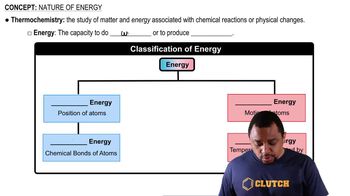Here are the essential concepts you must grasp in order to answer the question correctly.
Chemical Equilibrium
Chemical equilibrium occurs in a reversible reaction when the rates of the forward and reverse reactions become equal, resulting in no net change in the concentrations of reactants and products. At this point, the system is in a state of balance, and the concentrations remain constant over time.
Recommended video:
Chemical Equilibrium Concepts
Reaction Rates
The rate of a reaction refers to the speed at which reactants are converted into products. In a reversible reaction, the forward rate is the speed of the reaction forming products, while the reverse rate is the speed of the reaction forming reactants. Understanding these rates is crucial for analyzing the behavior of a system at equilibrium.
Recommended video:
Dynamic Nature of Equilibrium
Equilibrium is dynamic, meaning that even though the concentrations of reactants and products remain constant, both the forward and reverse reactions continue to occur at equal rates. This dynamic balance is essential for understanding how systems respond to changes in conditions, such as concentration, temperature, or pressure.
Recommended video:




